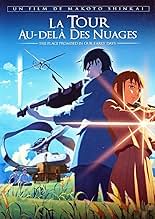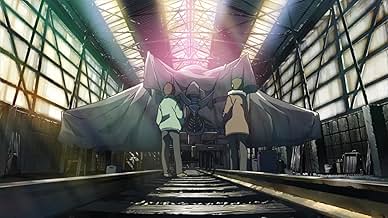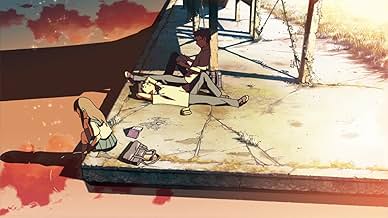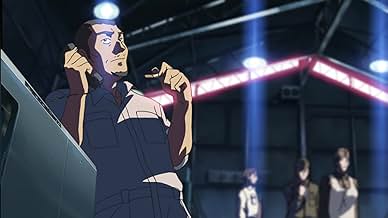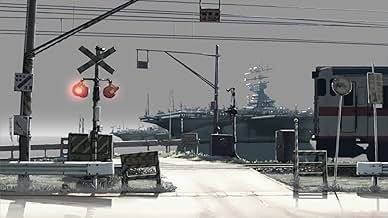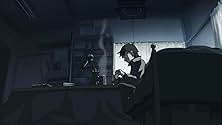VALUTAZIONE IMDb
6,8/10
15.795
LA TUA VALUTAZIONE
In una linea temporale alternativa del dopoguerra, il Giappone è diviso in Nord controllato dall'Unione e Sud controllato dagli Stati Uniti.In una linea temporale alternativa del dopoguerra, il Giappone è diviso in Nord controllato dall'Unione e Sud controllato dagli Stati Uniti.In una linea temporale alternativa del dopoguerra, il Giappone è diviso in Nord controllato dall'Unione e Sud controllato dagli Stati Uniti.
- Regia
- Sceneggiatura
- Star
- Premi
- 1 vittoria e 1 candidatura in totale
Yuka Nanri
- Sayuri Sawatari
- (voce)
- (as Yuuka Nanri)
Unshô Ishizuka
- Okabe
- (voce)
Kazuhiko Inoue
- Tomizawa
- (voce)
Risa Mizuno
- Maki Kasahara
- (voce)
Hidenobu Kiuchi
- Arisaka
- (voce)
Takeshi Maeda
- Daigakuinsei
- (voce)
- …
Rie Nakagawa
- Joshi Seito
- (voce)
- …
Yûki Nakao
- Joshi Seito
- (voce)
Maki Saito
- Joshi Seito
- (voce)
- (as Maki Saitou)
- …
Bretto Coleman
- Beigunjin
- (voce)
Ian O'Neal
- NSA
- (voce)
Recensioni in evidenza
The director and writer of The Place Promised in Our Early Days is a certain Makoto Shinkai who is otherwise famous for movies like 5 cm Per Second and Voices of a Distant Star. He has been hailed as one of the greatest anime directors or even the greatest, up there with legends like Hayao Myazaki. Since I saw his other two movies first and absolutely adore them, it is needless to say that my expectations for this movie were sky high. Simply put, I was not let down. Unlike the other two movies under the same direction, The Place Promised in Our Early Days has a very definite plot with clear dips, rises and climaxes. All in all, it is an exciting story that puts you in the center of a divided Japan with different powers controlling both sides. The plot might seem dry and overused on paper, but it is quite intriguing once you actually see it in action. Also driving the storytelling forward is this movie's sci-fi twist on parallel universes and how certain people react with them. Again, this movie certainly brings around one of the uniquer feeling tales around, even if it doesn't sound it. Anyone who has seen another Makoto Shinkai movie however will be able to tell you though, that it is not the story that makes his movies special, but the characters and the emotion that few movies come close to matching. Although it is still a huge distant beyond any other movie in this respect, the power behind to emotions is probably the weakest of all three movies. Don't get me wrong; you will still find the characters and their relations hauntingly and irresistibly real, but you aren't AS horrified when a character's life suddenly changes for the worse. Still, the feelings of loneliness, desperation, or exuberance, all of which Shinkai is famous for, are still found in their distinct, amazing way. Since this was the second of the three movies, it also seems as though it is a technical middle-step between the OK animation of Voices of a Distant Star, and the truly breath-taking visual found in 5 cm Per Second. The animation will not disappoint you, and there are some truly clever tricks that are used that make it look truly wonderful, but they won't stand out among the best in the industry. The music might just do that however with its beautiful, violin-heavy soundtrack that creates a great ambiance for whatever scene is currently playing. Also, the fact that the violin is featured in the soundtrack is of relevance to the plot, and makes both the character progression and the music appear that much sweeter.
Although I have criticized this movie a lot, for every thing it did wrong, it did a million things right. This still stands with the truly great anime movies out there and is a great watch for any fan of sci-fi influenced plots that will bring a surprisingly personal tone to the story.
Although I have criticized this movie a lot, for every thing it did wrong, it did a million things right. This still stands with the truly great anime movies out there and is a great watch for any fan of sci-fi influenced plots that will bring a surprisingly personal tone to the story.
Mind-bending sci-fi is a staple of Japanese animation, and many of them are complex in a way that makes them difficult to grasp immediately. This one, though, I really don't think the director has any idea how to tell a story. The film is just never coherent. Not only is its science fiction premise (which deals with alternate universes) never clear, nor its world comprehensibly established, but it's terrible at establishing characters and their relationships to each other. All of the characters are quite thin and clichéd. The artwork is nice(the animation is a bit choppy, though), and the music is pretty (but also occasionally too sappy), but this is an annoying mess of a film.
10StarAxis
This is an anime movie done by a relative newcomer to films: Makoto Shinkai, whose only previous directorial work was a half-hour short called "Voices of a Distant Star," in which he did all the animation himself on one laptop (even for Japan, a nation of workaholics, that was unheard of). It made him so famous that they gave him a full studio to work with for his next project, and when Makoto Shinkai doesn't have the constraints that a solo project would bring, look out.
The style of the film and its sci-fi and fantasy themes is equal parts steampunk and cyberpunk, with the film taking place in an alternate timeline of post-war Japan, only a few years from now. The main differences are the division between the North and South sides of Japan, and the research into parallel universes that has sprung up, resulting in the construction of a massive tower in Ezo (Hokkaido), which understandably captures the imagination and curiosity of the surrounding world.
Though the film is ostensibly a science fiction work, the plot involving a tower and alternate realities and so on plays second fiddle to the romantic drama, about three high school kids torn apart by war. The emotions blend with the fantasy elemts in a way that is handled with incredible elegance, care and sensitivity, and Makoto Shinkai's trademark poetic touch.
But what is more impressive is how the film shows that drama can be achieved through implausible situations. You see, too many directors think that in order to make a film "dramatic" and "touching," it must be about REALISTIC people in a REALISTIC setting having REALISTIC problems with REALISTIC resolutions, but Makoto Shinkai realizes a way around that, and uses a science fiction element not as a platform for action sequences, but rather as a way to achieve a kind of drama that you really couldn't get in a film that takes place in the "real world."
The film is aware that the sci-fi is playing second fiddle to the character drama, and doesn't waste any more time than it needs to trying to explain the film's bizarre sciences or justify the contrivances, rather leaving it up to the viewer to interpret and decipher what the fantasies of the film mean or symbolize. In other words, Shinkai wisely avoids the deathtrap of "Movie Science," and instead allows the audience to take things as they come and explain them ourselves.
The part about two teenagers building a plane that could get past a government-built radar system does seem a bit incredible, but this film does reflect on the incompetence of governments and how easy it is to get past them, so the required suspension of disbelief isn't really that big (I wish I found it hard to believe that a couple of teenagers could get past a bureaucratic governmental system in this day and age at all).
Also, the brief violence and "thrilling" assault on the tower are treated with perfect sincerity. The brief fight scenes are breathtaking in their realism and how they show that when someone gets punched, they get hurt. There are no legendary martial arts techniques or complex laser-rifle technology here, this film is about how people feel about each other and what they do when they are in trouble.
The ending is slightly abrupt and somewhat open-ended (although it is happy), but that is a theme in many anime. A lot is left up to the audience's interpretation and imagination, and the film only answers the questions that really matter.
The style of the film and its sci-fi and fantasy themes is equal parts steampunk and cyberpunk, with the film taking place in an alternate timeline of post-war Japan, only a few years from now. The main differences are the division between the North and South sides of Japan, and the research into parallel universes that has sprung up, resulting in the construction of a massive tower in Ezo (Hokkaido), which understandably captures the imagination and curiosity of the surrounding world.
Though the film is ostensibly a science fiction work, the plot involving a tower and alternate realities and so on plays second fiddle to the romantic drama, about three high school kids torn apart by war. The emotions blend with the fantasy elemts in a way that is handled with incredible elegance, care and sensitivity, and Makoto Shinkai's trademark poetic touch.
But what is more impressive is how the film shows that drama can be achieved through implausible situations. You see, too many directors think that in order to make a film "dramatic" and "touching," it must be about REALISTIC people in a REALISTIC setting having REALISTIC problems with REALISTIC resolutions, but Makoto Shinkai realizes a way around that, and uses a science fiction element not as a platform for action sequences, but rather as a way to achieve a kind of drama that you really couldn't get in a film that takes place in the "real world."
The film is aware that the sci-fi is playing second fiddle to the character drama, and doesn't waste any more time than it needs to trying to explain the film's bizarre sciences or justify the contrivances, rather leaving it up to the viewer to interpret and decipher what the fantasies of the film mean or symbolize. In other words, Shinkai wisely avoids the deathtrap of "Movie Science," and instead allows the audience to take things as they come and explain them ourselves.
The part about two teenagers building a plane that could get past a government-built radar system does seem a bit incredible, but this film does reflect on the incompetence of governments and how easy it is to get past them, so the required suspension of disbelief isn't really that big (I wish I found it hard to believe that a couple of teenagers could get past a bureaucratic governmental system in this day and age at all).
Also, the brief violence and "thrilling" assault on the tower are treated with perfect sincerity. The brief fight scenes are breathtaking in their realism and how they show that when someone gets punched, they get hurt. There are no legendary martial arts techniques or complex laser-rifle technology here, this film is about how people feel about each other and what they do when they are in trouble.
The ending is slightly abrupt and somewhat open-ended (although it is happy), but that is a theme in many anime. A lot is left up to the audience's interpretation and imagination, and the film only answers the questions that really matter.
I gave 4 stars just for the art and the music, but I really got bored a lot watching this, the story makes no sense, it's all so dreamy, so epic, the author wants you to deeply feel all this emotions but to me the result it's an hollow movie with hollow character. I've never fallen asleep watching something, but with this I barely succeeded to end it. I definitively suggest not to watch it, there are so many other beautiful anime to see out there. One thing I've enjoyed is the artwork, the landscapes are really intense and make you dream, but also there sometimes there is too much over production, too many light effects, it seems like a punch in the eye. And I hate when authors use science fiction in this way, by throwing here and there some gibberish theory and then making a mess with a convoluted plot, so that people at the end can say that it leave you with the freedom to interpret it, I find this technique over abused lately, and by the way I've never seen using it so badly like in this case
While a popular anime, I find that the title (The Place Promised in Our Early Days) is more interesting than the slow, plodding script. Many will find this film unmoving and uneventful.
The animation is so-so. In only one scene (a mountain background with mist) was I impressed; otherwise it's very typical. I'm honestly surprised by the number of reviews stating this is "beautiful". It's really simply not that impressive animation-wise. I guess beauty really is in the eye of the beholder.
The characters are largely undeveloped. The plot line is simple and mono-directional, without much in the way of suspense, surprise or emotional impact. There are no highs or lows, no real climax to the film, and the ending is weak.
I am a fan of anime and very much enjoy artistic anime. I don't need giant robot battles in order to enjoy a film-- and enjoy many aspects of the drama genre where story is as important as the animation itself. But this work struck me as mediocre in all aspects. I do appreciate that some may enjoy the (very)subdued romantic aspect, but I found it as undeveloped and uneventful as the rest of the work.
As would be expected I give it 5 stars. Neither impressive nor bad... just a slow-moving story, weak plot line and so-so animation.
The animation is so-so. In only one scene (a mountain background with mist) was I impressed; otherwise it's very typical. I'm honestly surprised by the number of reviews stating this is "beautiful". It's really simply not that impressive animation-wise. I guess beauty really is in the eye of the beholder.
The characters are largely undeveloped. The plot line is simple and mono-directional, without much in the way of suspense, surprise or emotional impact. There are no highs or lows, no real climax to the film, and the ending is weak.
I am a fan of anime and very much enjoy artistic anime. I don't need giant robot battles in order to enjoy a film-- and enjoy many aspects of the drama genre where story is as important as the animation itself. But this work struck me as mediocre in all aspects. I do appreciate that some may enjoy the (very)subdued romantic aspect, but I found it as undeveloped and uneventful as the rest of the work.
As would be expected I give it 5 stars. Neither impressive nor bad... just a slow-moving story, weak plot line and so-so animation.
Lo sapevi?
- QuizMakoto Shinkai intended to draw the background art himself but with an estimated 1000 cuts needed this would have been impossible for Shinkai to do alone and the film's animation producer, Kiyonori Hiramatsu went to Tokyo Art University to scout for artists. Adding to complications, many of the students were recruited from oil painting classes and had no experience in creating digital backgrounds and many hadn't even used PCs before.
- BlooperEnglish subtitles spell prophecies (used as a noun) as prophesies (the verb).
- Citazioni
Hiroki Fujisawa: [Narrating] Living alone, the nights seemed to last forever. When I couldn't pass the time effectively, I went to a nearby train station and pretended to wait for someone.
- Curiosità sui creditiThere's a brief shot after the credits.
- ConnessioniFeatured in WatchMojo: Top 10 Underappreciated Anime Movies (2016)
I più visti
Accedi per valutare e creare un elenco di titoli salvati per ottenere consigli personalizzati
- How long is The Place Promised in Our Early Days?Powered by Alexa
Dettagli
- Data di uscita
- Paese di origine
- Sito ufficiale
- Lingua
- Celebre anche come
- The Place Promised in Our Early Days
- Azienda produttrice
- Vedi altri crediti dell’azienda su IMDbPro
Botteghino
- Lordo in tutto il mondo
- 90.571 USD
- Tempo di esecuzione1 ora 30 minuti
- Colore
- Mix di suoni
- Proporzioni
- 1.85 : 1
Contribuisci a questa pagina
Suggerisci una modifica o aggiungi i contenuti mancanti

Divario superiore
What is the French language plot outline for Oltre le nuvole, il luogo promessoci (2004)?
Rispondi

